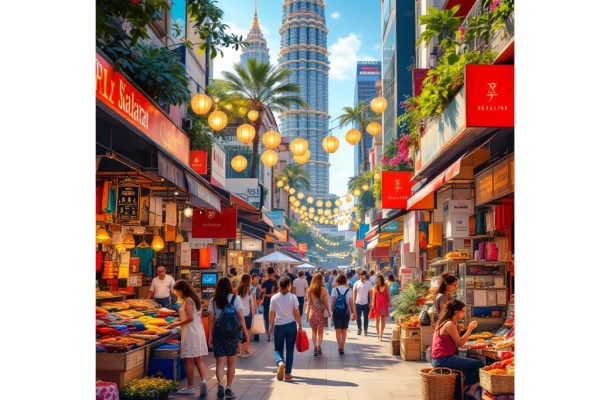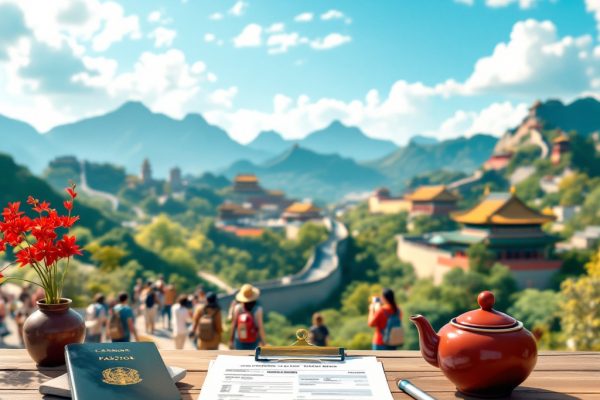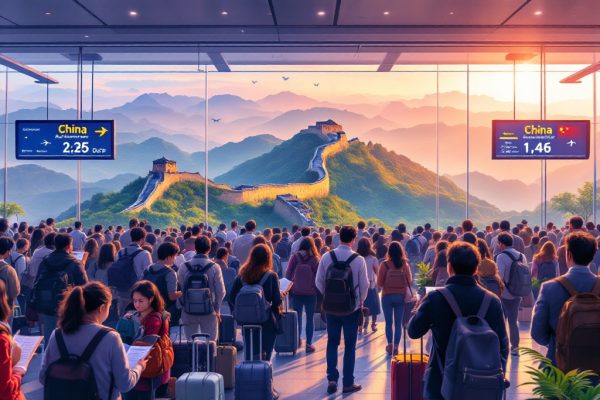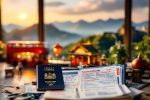China Solo Travel: Independent Exploration Ideas
Dream of exploring ancient wonders and bustling modern cities? Discover the magic of solo travel in China, a safe and enriching experience for every adventurer. Connect with friendly locals, explore diverse landscapes from serene valleys to the Great Wall, and savor the unique flavors of Peking duck and Sichuan hotpot. Learn how to navigate the language barrier, plan your trip with ease, and avoid common tourist scams. Start your transformative solo journey today – explore China, find yourself.
Important information

- China is considered safe for solo travelers, with low crime rates.
- Most nationalities need a visa; check specific requirements before traveling.
- Public transport (high-speed rail, subways, buses) is efficient and affordable. Booking transport and accommodation in advance is highly recommended, especially during peak season.
- While Mandarin is the official language, translation apps can help overcome language barriers. Learning basic Mandarin phrases enhances the experience.
- Spring and autumn are ideal times to visit for pleasant weather and fewer crowds.
Why Choose China for Solo Travel?
Embark on a solo adventure to China, a land of ancient traditions and modern marvels. This safe and secure environment, with low crime rates, allows for worry-free exploration. Discover diverse landscapes and rich culture at your own pace. Solo travel in China fosters self-discovery and personal growth as you navigate this vast and humbling country. Friendly and curious locals enhance the journey, creating opportunities for cultural exchange and lasting memories. A solo trip to China promises a deep cultural connection and a truly enriching, transformative experience.
Safety and Low Crime Rates
China is generally a safe destination for solo travelers, with low crime rates contributing to a sense of security for both men and women. This holds true even for those embarking on longer trips. However, even in safer environments, it’s wise to exercise caution and avoid areas known for potential risks.
Friendly and Curious Locals
Traveling solo in China offers a unique opportunity to connect with the welcoming locals. Known for their curiosity, they are often eager to engage with visitors, making it easy to strike up conversations on public transport or in bustling local markets. Consider staying in hostels or guesthouses to meet fellow travelers and locals alike. Cities like Chengdu, Yangshuo, Lijiang, and Dali are particularly welcoming to solo travelers. Seek out cultural festivals and workshops for a truly immersive experience.
A Humbling Travel Experience
Embark on a solo journey through China and unlock a unique opportunity to delve into its rich culture and history at your own rhythm. Independently navigating the bustling cities and serene landscapes fosters self-reliance and personal growth, encouraging introspection throughout your adventure. Immersing yourself in daily life, such as exploring local markets and engaging in conversations with residents, provides invaluable cultural insights. These transformative encounters challenge preconceived notions, broaden perspectives, and often inspire a renewed appreciation for your place in the world.
Planning Your China Solo Travel Adventure
Planning a solo trip to China? Securing your visa is the crucial first step. Next, book your flights and internal transportation in advance, especially if traveling to popular cities like Beijing or Shanghai. Familiarize yourself with the local currency, the Renminbi (RMB), also known as the Yuan. China’s high-speed rail network offers excellent connectivity, supplemented by subways, buses, and taxis.
Create a detailed itinerary. China offers a plethora of destinations, from stunning national parks to UNESCO World Heritage sites.
While learning basic Mandarin can enrich your experience, translation apps are invaluable for navigating language barriers.
Pack light, versatile clothing suitable for diverse weather conditions.
Research local customs and etiquette to ensure a respectful and enriching journey.
Enjoy your travels!
Visa Requirements for China
Planning a trip to China? Most nationalities require a visa, so check the specific requirements for your country with your local Chinese embassy or consulate. A valid passport, application form, photos, and proof of your travel plans (including hotel bookings) are typically necessary for a visa application. Citizens of a few countries, such as Japan, Singapore, and Brunei, can enjoy a 15-day visa-free stay for tourism. Short-term visa-free options are also available for transit passengers. Ensure you obtain the correct visa based on your purpose of travel, whether for tourism, business, or studies. Be sure to check the latest visa regulations before your trip, as they can change.
Booking Flights and Transportation in Advance
Booking flights two to three months in advance often yields better deals and saves you money. China’s excellent public transport system, including subways, buses, and high-speed trains, makes travel both affordable and convenient. Factor this into your budget and plan your itinerary accordingly. Reserving train tickets in advance is highly recommended, particularly during peak season.
Understanding Currency: Renminbi, RMB, Yuan
China’s official currency is the renminbi (RMB), with the yuan (CNY) being its basic unit. Think of it like dollars and cents: the yuan is similar to the dollar, while the jiao and fen are like cents. One yuan equals ten jiao, and one jiao equals ten fen. While fen are rarely used due to their low value, jiao are common. You’ll typically see prices displayed as CNY, ¥, or 元.
Essential Travel Tips for Independent Exploration
China experiences diverse weather patterns. The north has harsh winters and scorching summers, while the south has mild winters and hot, humid summers. Spring (April-May) and autumn (September-October) offer the most comfortable temperatures and fewer crowds. Packing layers is recommended to accommodate varying conditions. Check regional forecasts before your trip.
Consult your doctor about recommended vaccinations and health precautions before traveling to China. Pack a comprehensive first-aid kit and any necessary prescriptions. While China has good hospitals, medical care can be expensive, so travel insurance is advisable. Exercise caution with food safety and drink bottled water.
While English isn’t widely spoken, translation apps can help bridge the communication gap. Consider using Pleco, Google Translate, or WeChat for translating text and speech. Learning basic Mandarin phrases like “ni hao” (hello) and “xiexie” (thank you) can enhance your experience. A notepad and pen, along with offline maps, can be invaluable, especially in areas with limited internet access.
Pre-booking accommodations and transportation is recommended. Having addresses written in Chinese will simplify your travels.
Weather Preparation: Best Time to Visit
For the ideal China trip, aim for spring (April-May) or autumn (September-October). These seasons offer pleasant temperatures and fewer tourists.
Summer (July-August) can be hot and humid, while winters are quite cold, especially in northern China. Be aware of higher prices and more visitors during Chinese New Year.
Health and Safety Considerations
Before your trip, consult your doctor about recommended vaccinations and necessary medications. Pack a well-stocked first-aid kit. When it comes to food and water, prioritize safety: opt for bottled water and dine at established restaurants. Stay vigilant about your surroundings and protect your belongings. Familiarize yourself with common scams to avoid falling victim to theft, particularly in crowded areas. Consider travel insurance to safeguard against unexpected issues or unforeseen events.
Communication: Navigating the Language Barrier with Apps
Traveling to China? Enhance your trip by using these communication tips:
Download a translation app. This will be invaluable for easy communication with locals.
Learn basic Mandarin phrases. Even a few common expressions can significantly enhance your experience.
Carry a phrasebook. Phrasebooks provide quick access to everyday expressions.
Use non-verbal cues. Gestures can bridge communication gaps, but be mindful of cultural nuances.
By combining these approaches, you’ll foster richer interactions and deeper cultural immersion, connecting you with people on a more meaningful level.
Accommodation Options for Solo Travelers
Traveling solo in China offers a range of accommodation choices to suit different preferences and budgets. For budget-conscious travelers and those looking to connect with other adventurers, hostels are an excellent option. If you prefer a more immersive cultural experience, consider staying in a local guesthouse. For those seeking more traditional amenities and comfort, China has a plethora of hotels to choose from. Booking your accommodations in advance is highly recommended, especially if traveling during peak season. Also, look for flexible cancellation policies in case your travel plans change unexpectedly.
Choosing Between Hostels, Guest Houses, and Hotels
Looking for budget-friendly travel options? Consider hostels for a cost-effective stay and a chance to meet fellow travelers. If you prefer a more immersive cultural experience, guesthouses offer a glimpse into local life. Hotels cater to various preferences, from basic rooms to luxurious suites. When choosing your accommodation, consider your budget and desired level of social interaction. Booking ahead and checking reviews are always recommended, especially during peak season.
Getting Around: Transportation in China
Traveling within China is convenient and affordable, thanks to its comprehensive public transportation system. Use the efficient and affordable subway to navigate major cities like Beijing and Shanghai. For budget travelers, buses offer the most economical way to explore. Taxis are readily available; having your destination written in Chinese ensures clear communication with drivers. Ride-hailing apps provide another convenient choice.For long-distance travel, China’s high-speed rail network connects major cities across the country, offering a comfortable and efficient mode of transport. Domestic flights are also readily available for longer distances. Booking both train and plane tickets in advance, especially during peak season, is highly recommended to secure your travel arrangements.
Public Transportation: Subways, Buses, and Taxis
Traveling within China is made easy and affordable thanks to its comprehensive public transport system. Explore your options with subways, buses, and taxis. Subways are ideal for navigating major cities like Beijing and Shanghai, providing quick and efficient travel. Buses, on the other hand, extend their reach to almost every part of the country. While some basic Chinese can be helpful for understanding routes, it’s not essential. Taxis offer convenient door-to-door service, and having your destination written in Chinese can simplify the process. For a seamless travel experience, consider downloading a transportation app to aid with route planning and ticket purchases.
High-Speed Trains and Domestic Flights
Traveling within China offers efficient options. For quick travel between major cities, high-speed rail is the fastest mode of transport. For longer distances, domestic flights are a practical and affordable alternative, especially when compared to similar flights in North America. Remember that your passport is required when purchasing train tickets, and booking in advance is recommended.
Exploring Chinese Culture and Cuisine
Respect and harmony are highly valued in traditional Chinese culture. Gift-giving is a common custom, but avoid giving clocks or sharp objects. Public displays of affection are generally frowned upon. Learning a few basic Mandarin phrases, such as “ni hao” (hello) and “xiexie” (thank you), demonstrates respect and cultural sensitivity.
Exploring Chinese Cuisine
Chinese cuisine offers a diverse range of flavors and regional specialties.
- Peking duck, a Beijing classic, is prized for its crispy skin.
- Sichuan hotpot, a communal dining experience, features a spicy broth.
- Dim sum, ideal for brunch, offers an array of small plates, including dumplings.
Noodles and rice are staple foods throughout China.
Dining Considerations
Vegetarian options are becoming more widely available, especially in Buddhist cuisine, which focuses on plant-based dishes.
While street food can be tempting, ensure it’s thoroughly cooked to avoid health issues. It’s generally recommended to stick with bottled water. Clearly communicate any dietary restrictions, using a translation app if needed.
Understanding Cultural Etiquette and Traditions
Respect, modesty, and patience are highly valued in Chinese culture. Dressing modestly, particularly when visiting religious sites, is a sign of respect.
Learning basic Mandarin phrases like “ni hao” (hello) and “xiexie” (thank you) can significantly enhance your interactions and demonstrate cultural sensitivity.
Chinese dining customs also play a crucial role. Proper chopstick etiquette and a willingness to sample all offered dishes are appreciated.
Good public behavior, such as queuing politely and avoiding loud conversations, is essential.
Researching regional customs before your trip will enrich your travel experience.
Must-Try Dishes: Peking Duck, Sichuan Hotpot, and More
Peking duck, renowned for its crispy skin, is a quintessential Beijing culinary experience. Sichuan hot pot, with its simmering spicy broth, offers a lively communal meal. Dim sum, bite-sized steamed or fried delicacies, presents another enticing option. The savory stir-fry Kung Pao chicken, featuring peanuts and chilies, is yet another popular dish. Beyond these classics, consider regional specialties like Xi’an’s hand-pulled noodles or Yunnan’s unique crossing-the-bridge noodles. Countless other culinary delights await exploration throughout China.
- Peking duck, known for its crispy skin, a Beijing culinary experience.
- Sichuan hot pot, a spicy broth, for a lively communal meal.
- Dim sum, bite-sized steamed or fried delicacies.
- Kung Pao chicken, a savory stir-fry with peanuts and chilies.
- Xi’an’s hand-pulled noodles, a regional specialty.
- Yunnan’s crossing-the-bridge noodles, a unique culinary experience.
Vegetarian Options and Food Safety Tips
China offers diverse vegetarian options, often featuring tofu, vegetables, and mushrooms.
Use a translation app or phrasebook to clearly communicate your dietary preferences, ensuring your meals meet your needs.
For food safety, consume piping hot meals and avoid raw or undercooked meat and seafood.
If trying street food, choose busy vendors who maintain good hygiene practices like frequently replenishing their food.
Drink bottled water, even for brushing your teeth, and peel all fruits and vegetables.
Pack medications for potential digestive issues.
Unique Destinations and Outdoor Adventures
Embark on a solo adventure to China and discover these captivating destinations:
- Explore the breathtaking pillar-like formations of Zhangjiajie National Park.
- Delve into history and culture at UNESCO World Heritage Sites, including the Great Wall and Forbidden City.
- Witness the awe-inspiring Terracotta Army at the Mausoleum of Emperor Qin Shi Huang.
- Admire traditional Chinese architecture in the charming Fenghuang Ancient Town.
- Immerse yourself in the stunning natural beauty of Jiuzhaigou Valley, with its vibrant lakes and cascading waterfalls.
National Parks and UNESCO World Heritage Sites
China’s national parks offer breathtaking landscapes, from the karst mountains of Guilin and Lijiang to the verdant forests of Jiuzhaigou Valley. Many of these parks, alongside cultural landmarks like the Great Wall, Forbidden City, and Terracotta Army, are recognized as UNESCO World Heritage Sites, preserving their significance for future generations. Journeying through these locations unveils China’s captivating history, showcasing its distinctive architecture and remarkable artistry.
Must-Visit Places: Mausoleum of Emperor Qin Shi Huang, Fenghuang Ancient Town, Jiuzhaigou Valley
Embark on a captivating journey through China, starting with the ancient city of Xi’an. Witness the awe-inspiring Terracotta Army, a vast collection of life-sized terracotta soldiers, horses, and chariots guarding the Mausoleum of Emperor Qin Shi Huang. Next, immerse yourself in the architectural splendor of Fenghuang Ancient Town in Hunan province. Explore the beautifully preserved buildings from the Ming and Qing dynasties, offering a glimpse into China’s rich history. Finally, escape to the breathtaking natural beauty of Jiuzhaigou Valley in Sichuan. This UNESCO World Heritage site is renowned for its dazzling array of colorful lakes and cascading waterfalls, a true spectacle of nature’s artistry.
Overcoming Challenges and Culture Shock
Exploring a Mandarin-speaking region presents unique challenges for non-speakers, but here are several ways to navigate these linguistic hurdles:
- Use a translation app on your phone for quick communication.
- Learn a few basic Mandarin phrases to enhance your experience.
- Carry a notepad and pen to jot down essential information.
- Use non-verbal cues like gestures and body language.
- Hire a local guide for personalized assistance and cultural insights.
Tourist scams are a global reality. Exercise caution and take these precautions:
- Be wary of overly friendly strangers.
- Negotiate prices upfront for any purchase or service.
- Research reputable tour operators beforehand.
- Avoid unofficial taxis.
- Always double-check your change after transactions.
- Report any scams to the local authorities.
Language Barrier Solutions for Non-Mandarin Speakers
Utilize a translation app to navigate unfamiliar linguistic landscapes.
Learn basic Mandarin phrases to bridge communication gaps.
Use a phrasebook to jot down and access key phrases.
Use gestures as effective communication aids.
Avoiding Common Tourist Scams
Traveling safely requires vigilance against common scams. Be cautious of overpriced tea ceremonies, counterfeit goods, and rigged street games. Avoid overly friendly strangers who may lure you into scams involving tea or performances. Always negotiate prices in advance, inspect goods thoroughly, and avoid street games entirely. Research common scams at your destination beforehand. Confirm taxi fares in advance and use reputable transportation. Report any suspicious activity to local authorities.
Be wary of overpriced offers, such as tea ceremonies or performances, often used to inflate prices for unsuspecting tourists.
Beware of counterfeit goods. Inspect goods carefully before purchasing, as counterfeit items are prevalent in many tourist destinations.
Steer clear of street games. These games are often rigged, and tourists are likely to lose their money.
Be cautious of overly friendly strangers. They might be attempting to lure you into a scam.
Negotiate prices beforehand. This will help you avoid being overcharged for goods and services.
Research common scams at your destination. Being aware of common scams can help you avoid them.
Confirm taxi fares in advance. This will prevent disputes and ensure a fair price.
Opt for reputable transportation services. This enhances your safety and reduces the risk of scams.
Report suspicious incidents. Contact local authorities if you encounter any suspicious activity or become a victim of a scam.
Empowering Solo Female Travelers in China
A solo trip for women in China offers incredible rewards, but prioritizing safety is paramount. Dressing modestly and respecting local customs are essential for a positive experience. Opt for reputable accommodations and keep emergency contacts readily available. Connect with fellow travelers and locals in hostels or cafes to build a support network. Learning basic Mandarin can significantly enhance your interactions and overall experience.
Planning and Preparation
- Thorough itinerary planning and destination research are crucial for a smooth and enjoyable trip.
- Understanding local customs is key to navigating cultural differences and showing respect.
- Secure your belongings and stay in contact with family and friends for added safety and peace of mind.
During Your Trip
- Utilize China’s efficient public transport, but always carry a reliable map or GPS for navigation.
- Embrace new experiences and connections, while remaining aware of your surroundings for personal safety.
- Offline resources and a portable phone charger can prove invaluable in emergencies, ensuring you stay connected and informed.
Safety Tips and Recommendations
Secure your accommodation in advance and research reliable transportation options like reputable taxi companies or ride-hailing services.
Learning basic Mandarin can enrich your travel experience.
Share your itinerary with someone back home.
Stay alert, especially at night, and avoid walking alone in poorly lit areas.
Keep your valuables hidden and be mindful of local customs, dressing modestly when visiting religious sites.
Carry copies of your passport and visa, and register with your embassy upon arrival.
Ensure you have comprehensive travel insurance that covers medical emergencies and evacuations.
Experiences from Solo Female Travelers
China has become a popular destination for solo female travelers, who often find the people welcoming and helpful. Exploring bustling local markets offers exciting opportunities to discover new foods and unique treasures. Navigating cities independently can be an empowering experience. Some women opt for group tours to connect with fellow travelers, while others prefer solo exploration, uncovering hidden gems at their own pace and interacting directly with locals. Though language barriers can sometimes pose a challenge, translation apps and a few basic Mandarin phrases prove incredibly useful. These experiences not only boost confidence and foster a deeper appreciation for Chinese culture, but often leave women feeling transformed by their solo journeys through China.

















